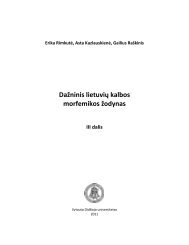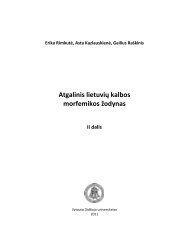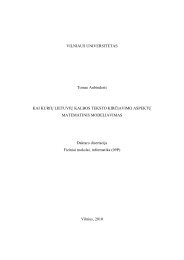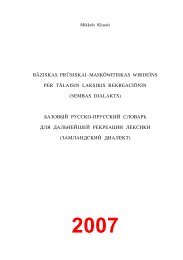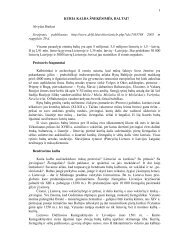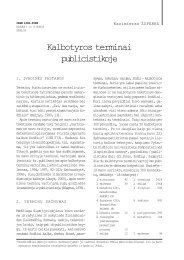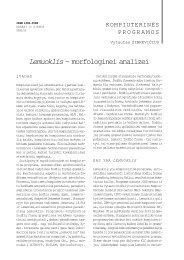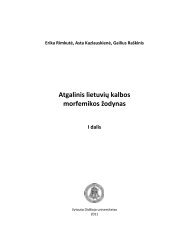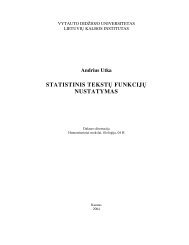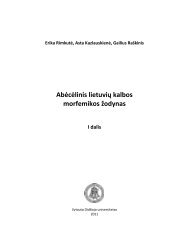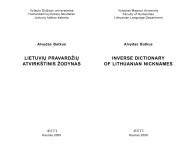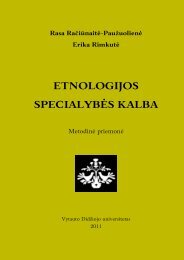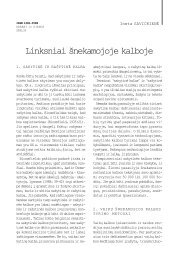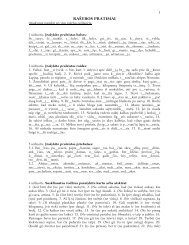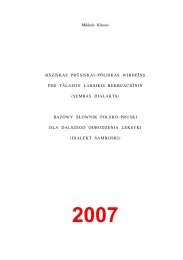HISTORICAL GRAMMAR OF OLD PRUSSIAN
HISTORICAL GRAMMAR OF OLD PRUSSIAN
HISTORICAL GRAMMAR OF OLD PRUSSIAN
Create successful ePaper yourself
Turn your PDF publications into a flip-book with our unique Google optimized e-Paper software.
<strong>HISTORICAL</strong> <strong>GRAMMAR</strong> <strong>OF</strong> <strong>OLD</strong> <strong>PRUSSIAN</strong><br />
III appeared “because translator of I was not a native Samlandian but was<br />
possibly a Natangian”.<br />
As for the final Pr. *-ç, it remained unchanged under the stress in all<br />
Catechisms, e.g. semç (III) ‘earth’, druwç (III) ‘believes’ = druwe (I, II,<br />
III) ‘idem’ (cf. * 226). However it was shortened when unstressed: *-ç (><br />
*-î) > *-Ÿ, e.g. mûti (III) ‘mother’, drowy (II) ‘believes’ 12 . Besides that, the<br />
stressed -ç reflects Pr. (Cat.) *-çja > *-çj > *-ç in such instances as budç<br />
(III) ‘is awake’, milç (III) ‘loves’ etc. (Endzelîns SV 111, Stang Vergl.<br />
Gr. 320), see also * 224.<br />
* 16. Balt. *` (= *¯É, cf. Stang Vergl. Gr. 37, see further) is preserved<br />
in the Elbing Vocabulary in spellings o and oa, i.e. *¯É = *` (! cf.<br />
* 19), e.g.: mothe = *m¯Étç ‘mother’, brote = *br¯Étç ‘brother’, soalis =<br />
*z¯Élîs ‘grass’ (PEÞ IV 139). As for the Catechisms, Pr. *` (= *¯É!) turned<br />
into *û there after the labials and gutturals (LG), e.g.: nom. sg. mûti (III)<br />
‘mother’, acc. sg. mûtien (II), muttin (I) ‘idem’ [such *û never underwent<br />
further diphthongization described in * 13 – L.P.]. This Pr. *` (= *¯É!)<br />
remained unchanged in all positions except after LG (cf. Bûga III 106),<br />
12 druwe (III) cannot have -ç < *-ç because of praes. druwçse, druwçmai, not o -druwîmai-! There<br />
is no difference between (III) budç, milç on the one side and (III) druwç (as well as billç, quoitç,<br />
stallç * 225). First, the spelling druwe is attested 2x beside drowy 1x in the same II. If the ending<br />
-y in the latter was really unstressed, the spelling of the stressed u as o beside the spelling of the<br />
unstressed u as u in 2 other instances should seem doubtful. Secondly, in case the verbs<br />
druwç, billç, quoitç, stallç are not the same çja-stem verbs as budç and milç, then their stem<br />
vowel ç should have but turned into -î- in plural forms (III) druwçmai, billçmai, quoitçti, quot`mai<br />
(probably = *kwait’`mai = *kwaitçmai), stallçmai, stallçti and should have been preserved as î at<br />
least once if this ç were really generalized from the form of the 3rd person (* 212). Therefore it<br />
seems no less credible to see a secondary circumflex diphthong -çja- > -çj- = -…ei- > -ç- in closed<br />
syllable in these plural forms. Such diphpthong is well preserved in the participle form (III)<br />
waitiaintins = *vait’`intins < *vait’`jantins. Cf. Palmaitis BGR 223 [cf. ibid. for alternation<br />
in allomorph pairs in stems and suffixes `i / `, çi / ç (all accented), as well as at the end of words<br />
-`i / -`, -çi / -ç (accented), -ai / -a, -ei / -e (generalized, unaccented) what can be supported<br />
additionally by such hyper-corrections as (III) giwei = *giwç. An oxytone stress in giwei is evident<br />
from Latvian correspondence dz±ve with a broken acute]. Cf. ftn's 92, 109.<br />
Since there is no apparent reason (except traditional opinions) to make difference between<br />
verbs (III) budç, milç and druwç, billç, quoitç, stallç, the spelling drowy (II) can be treated as<br />
reflecting a stressed suffix *-ija, i.e. *druvî = *druvij < *druvija / *druvçja, cf. pairs Latv. rûs±t<br />
/ rûs°et, Lith. trûnÑja / tr»ni – L.P.<br />
19



